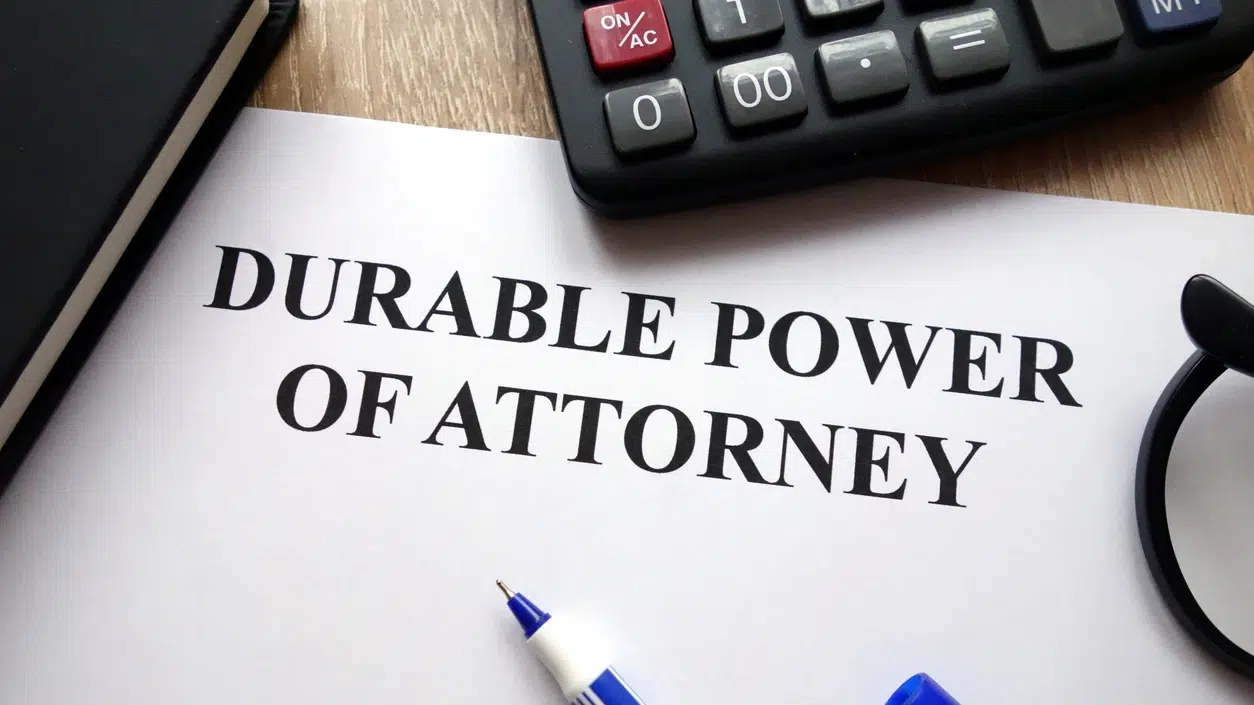A durable power of attorney is a legal document that allows you to appoint someone else, known as your “attorney-in-fact” or “agent,” to act on your behalf in financial and legal matters. This can be a valuable tool for individuals who want to have someone they trust handle their affairs in the event that they become incapacitated or unable to manage their own affairs due to illness, injury, or other circumstances. In this article, we will explore what a durable power of attorney is, how it works, and why it may be a useful tool for you to consider as part of your estate planning documents.
How Does a Power of Attorney Work?
A power of attorney (POA) is a legal document that allows one person (the “principal”) to appoint another person (the “agent” or “attorney-in-fact”) to act on their behalf in legal and/or financial matters. The principal can give the agent broad powers to handle a variety of tasks, or they can specify specific powers and limit the scope of the agent’s authority. The POA can take effect immediately or be set to take effect at a future date or under certain conditions.
For example, if the principal is unable to manage their financial or health care affairs due to illness or other reasons, they can grant their agent the power to handle their financial decisions and bank accounts on their behalf. This could include paying bills, filing tax returns, managing investments, and making financial decisions. Similarly, if the principal is unable to make medical decisions for themselves, they can grant their agent the power to make medical decisions on their behalf.
It’s important to note that the agent does not have complete control over the principal’s affairs. They are only granted the powers specified in the POA document and are expected to act in the best interests of the principal and follow their instructions to the best of their ability.
What Are the Different Types of Powers of Attorney?
There are two general powers of attorney that individuals can use depending on their specific needs and circumstances. These include:
Financial power of attorney: A Financial POA grants the agent the authority to handle financial or business matters on behalf of the principal. The principal can give broad permission for a wide range of tasks, or they can specify specific powers and limit the scope of the agent’s authority. For example, a principal may grant a financial power of attorney to an agent to handle the sale of a piece of real estate in another state (a form of non-durable power).
Medical power of attorney: A medical POA grants the agent the authority to make health care decisions on behalf of the principal if they are unable to do so themselves. The principal can specify what types of medical treatment decisions they do or do not want to receive in the event of incapacitation, such as the use of assisted food intake or breathing. A living will is usually drafted and attached to the healthcare power of attorney. Advance health care directives can also be included.
How Are Powers of Attorney Activated? Do They Expire?
Powers of attorney are typically activated when they are executed properly by the person creating the power of attorney document (known as the “principal”). They can also be a “springing” power, only coming into effect when a triggering event occurs (either incapacity or a certain date or event occurs).
The duration of a power of attorney depends on the terms of the document. A durable power of attorney remains in effect until it is revoked or the principal dies. A springing power of attorney goes into effect when the specified event or condition is met and remains in effect until it is revoked or the principal dies. A limited power of attorney expires once the specified task is completed or the time period ends.
It is important to choose the type of power of attorney that best meets your needs and ensure that it is properly executed in order for it to be effective. If you are unsure about which type of power of attorney is right for you or have questions about the activation process, you should consider consulting with an estate planning attorney.
What Are the Pros and Cons of a Durable Power of Attorney?
A durable power of attorney can provide peace of mind and ensure that your affairs are properly managed, even if you are unable to do so yourself.
However, there are also some potential downsides to consider when deciding whether a durable power of attorney is right for you. Some of the pros and cons of a durable power of attorney include:
Pros:
- A durable power of attorney is relatively simple and inexpensive to set up and maintain.
- It can protect your wealth from expensive court proceedings if the principal becomes incapacitated without one.
- The durable power of attorney can be very specific about what is and isn’t authorized and when the agent is allowed to begin handling responsibilities.
- The agent is required to keep detailed records of their actions on behalf of the principal, which are available for review at any time.
- The principal has the right to revoke the power of attorney at any time.
- The durable power of attorney is a confidential legal document that does not need to be disclosed to anyone outside of the involved parties.
- A durable power of attorney allows your loved ones and adult children to avoid having to ask the probate court to impose a conservator on you.
- You are able to include any advance directives you may desire.
Cons:
- A durable power of attorney expires upon the death of the principal. It cannot be used to settle an estate, for which a last will or living trust (or both) must be created.
- There is no active oversight of the actions of the agent under a durable power of attorney, meaning that if the agent is dishonest, there may be no recourse.
- The principal must be competent when signing or revoking a durable power of attorney. If they become incapacitated beforehand, it is too late to create one.
- If the principal decides to revoke the durable power of attorney, they must contact all third parties that are affected by the revocation.
What Should I Consider When Choosing an Agent for My Durable Power of Attorney?
Choosing the right agent is an important decision, as they will be responsible for making decisions on your behalf and carrying out your wishes.
Here are some factors to consider when selecting an agent for your DPOA:
Trustworthiness: It’s important to choose someone you trust to act in your best interests and follow your instructions to the best of their ability. This could be a family member, adult child, trusted friend, or a professional such as an attorney or licensed private fiduciary.
Availability: Consider the availability of the person you are considering as your agent. If you are incapacitated and need your agent to make decisions on your behalf, you’ll want to make sure they are available to do so.
Capability: The agent you choose should be capable of handling the responsibilities associated with the DPOA. If you are granting financial powers, for example, you’ll want to choose someone who is financially savvy and capable of managing your financial affairs. Familiarity with family law and elder law may be helpful.
Compatibility: It’s important to choose an agent who shares your values and beliefs, as they will be making decisions on your behalf. You’ll want to choose someone who you believe will make decisions that align with your wishes.
Reliability: Consider the reliability of the person you are considering as your agent. If you are incapacitated and need your agent to make decisions on your behalf, you’ll want to make sure they are reliable and will follow through on their responsibilities.
What Do I Need to Do to Set Up a Durable Power of Attorney?
Creating a durable power of attorney involves a few simple steps:
- Choose your agent: As mentioned above, it is important to carefully consider your options and choose an agent you trust and who is capable of handling the responsibilities of the role.
- Determine the scope of the agent’s powers: Your durable power of attorney should clearly outline the powers you are granting to your agent. Be as specific as possible to ensure that your agent has the authority to act in accordance with your wishes.
- Choose a successor agent: In the event that your primary agent is unable or unwilling to serve, you should have a successor agent to step in.
- Have the document drafted: You can either use a state provided template or have a durable power of attorney drafted by an attorney. If you choose to use the template, be sure to use a POA form that is specific to your state and follow the directions closely. If you choose to have it drafted by an attorney, they will be able to advise you on the specific requirements for your state and ensure that the document is properly executed.
- Sign the document in front of witnesses and a notary: In order for the durable power of attorney to be effective, it must be signed by you (the principal), a witness, and a notary. Different states have different execution requirements.
Can You Revoke a Durable Power of Attorney?
Yes, you can revoke a durable power of attorney at any time, as long as you are competent to do so (not under any incapacity). To revoke the document, you will need to inform your agent in writing and provide copies of the revocation to any third parties that may be affected by the revocation, such as financial institutions or healthcare providers.
Should You Use an Attorney to Draft Your Durable POA?
There are several reasons why you should consider using an attorney to draft a power of attorney (POA). An attorney is trained in the legal issues surrounding POAs and can ensure that the document is properly executed and meets all legal requirements. They can also help you tailor the POA to fit your specific needs and goals, and advise you on the best course of action for your situation. Using an attorney can also help to avoid misunderstandings or conflicts between you and your agent by clearly explaining the responsibilities of the agent and ensuring that both parties understand their roles and obligations. Overall, using an attorney to draft a POA can provide peace of mind and ensure that the document is legally sound and effective.
Our estate planning and administration attorneys at Copper State Planning have the experience carefully craft any power of attorney agreement you may need. Contact us at our Phoenix law office by calling 480-442-6413 or by filling out our confidential contact form for a consultation.








